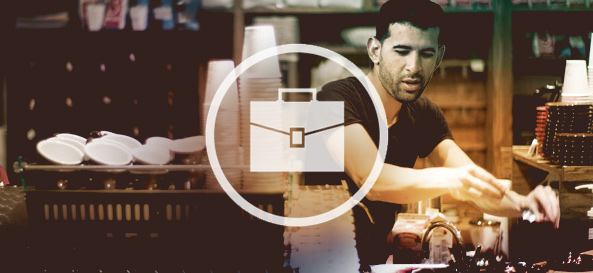
The economic outlook for many young people in search of a job is grim. In the March 2013 Millennial Job Report, nearly 12 percent of young people ages 18-29 are unemployed. For those who just graduated college, about half can find full-time work. Only 30 percent of those who have a job see their current positions as stepping into a meaningful career.
For the remaining 70 percent of recent college grads, “I’m just working a coffee shop job until I figure things out” defines their state. This sums up the mindset of most twentysomethings with a diploma, including me.
In the summer of 2011, right after graduation, I was a barista in San Diego. It was great—for a while. I could pay most of my bills, eat California burritos, and go surfing in the middle of the day. Did I mention I got free coffee?
But as a month or two went by, my attitude changed. While I appreciated the income and the friendships with my co-workers, I grew discontent. I was only working part-time, and I didn’t like the fact that I didn’t see myself contributing to society in any other way except serving coffee.
Before graduating from college, I had meaningful full-time summer jobs, working at camps in the Santa Cruz Mountains and the Pennsylvanian countryside. These experiences were formative and, I felt, made a difference. Because I felt like I was doing something for the greater good and felt needed, these “jobs” didn’t feel like a job. It felt like a calling.
But in my first weeks of post-grad life, I started to see that my job consisted mainly of serving the upper-middle class their skinny vanilla lattes. And then I began to have doubts about what I was doing with my life. I didn’t have a job that “contributed to society” or “fought against social injustice,” and it was making me feel depressed.
I wasn’t a barista for long, but in hindsight, I can see that it was in the coffee shop where I learned what work truly means. It was there that I learned the value of everyday integrity, excellence, responsibility and a work ethic oriented to serving Christ in all things. It took me this entry-level experience to learn that any work, done in excellence, for the glory of God, is in fact meaningful. It also taught me that my job title does not solely define who I am. In this sense, I can truly say my stint as a barista was just as life-changing as my job at a non-profit I greatly respect which came next.
In the first few months of post-grad life, I learned that casting your complete joy in life on your job is an unhealthy way to live.
Even before sin entered the world, work was created to be a fundamental part our lives. God created Adam and “placed him into the Garden of Eden to work and keep it” (Genesis 2:5). By placing Adam and Eve in the garden to work, God shared with us in the responsibility of creation and creativity.
Of course, the reality is that now we do live in a world where there is sin—and sin often warps our work. We may have an incredible work ethic, but if we’re working for or toward the wrong thing, it’s wasted. In a fallen world, our work has the power to exploit, abuse or treat others unfairly. Yet because we are made in the image of a Creator God, our work also has the power to bring good things to life. It is our choice how we put our gifts and skills to use. Using your time and skills that ultimately come from God, you can create something that can fulfill a societal need.
Through this act of sacrifice, you are (and should be) paid and why tithing is so important. You are using the skills you have been blessed with, and returning some of your reward to the Church, an institution building the Kingdom of God. So here’s the truth: It doesn’t really matter to God where you work—as long as it’s a job that values and seeks to uphold human life and dignity. It’s how you do your work that matters.
In his book Vocation: Discerning Our Callings in Life, Douglas J. Schuurman says all “Human beings participate in God’s provident care for creation through their activities as parents, artisans, farmers, princes, and preachers.”
The reformers, Martin Luther in particular, argued that the work of a preacher and a common worker are both valued if performed in faith and with the correct heart.
In a famous story, a recent Christian convert who was a shoemaker asked Luther, “What should I do now?” hoping to hear that he should sell all his possession and pursue a job in the church. But to his surprise, Luther told him simply, “Make a good shoe, and sell it at a fair price.”
Scripture consistently teaches that whatever our work, we should work diligently. In Ecclesiastes 9:10, King Solomon instructs “Whatever your hand finds to do, do it with your might, for in the realm of the dead, where you are going, there is neither working nor planning nor knowledge nor wisdom.”
Because the reality is that our jobs are temporary. Sheol—Hebrew for “grave” or “hell”—reminds us that everything will come to an end. Like James says, we do not know what our life holds tomorrow, “For you are a vapor that appears for a little time, and then vanishes away” (4:14).
Therefore, there’s no need to wrap our identity tightly around our job title. This doesn’t mean you should stay in a job where you’re floundering, or that you have to seek a ministry position. If you feel that your calling is elsewhere, take up that call and move. If you don’t know what you are passionate about, go looking and figure it out. Take chances. More importantly, be patient and give yourself grace. Pray that God may reveal your calling to you, and the opportunities to use your gifts.
While I am still trying to grasp my true calling, I can rest in the knowledge that my career doesn’t define who I am. I am more than a barista, a non-profit worker, a writer. You are always more than what you just do.
What matters is not where we work, whether at an entry-level day job or a dream company. What matters to God is how we work—with diligence, with excellence, with self-sacrifice that honors Him and serves others.






















